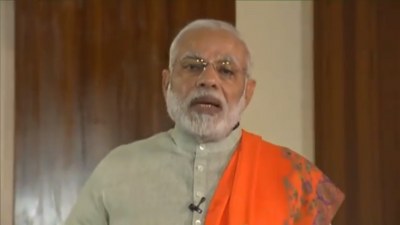Cabinet approves Ordinance to confiscate properties of fugitive economic offenders

New Delhi : In a bid to bring back defaulters of huge bank loans who escape to refuges abroad, the Union Cabinet on Saturday approved an ordinance that would provide for attachment and confiscation of the properties of the economic offenders.
The decision to issue The Fugitive Economic Offenders Ordinance, 2018 was taken at a meeting of the Cabinet presided over by Prime Minister Narendra Modi which comes in the wake of the recent multi-crore Punjab National Bank fraud case, in which the main accused diamond trader Nirav Modi and his uncle Mehul Choksi fled the country after duping the bank to the tune of over Rs. 30,000 crore.
Some other similar offenders, including businessman Vijay Mallya, who headed the now-defunct Kingfisher Airlines, also escaped to London a few years after running up huge debts to consortiums of banks.
Sources said the Ordinance aims at deterring economic offenders from evading the process of Indian law by remaining outside the jurisdiction of Indian courts.
Under the ordinance, a special forum would be created for expeditious confiscation of the proceeds of crime, in India or abroad, that would coerce the fugitive to return to India to submit to the jurisdiction of Courts in India to face the law in respect of scheduled offences.
The Ordinance makes provisions for a ‘Special Court’ under the Prevention of Money-laundering Act, 2002 to declare a person as a Fugitive Economic Offender.
A Fugitive Economic Offender is described as a person against whom an arrest warrant has been issued in respect of a scheduled offence and who has left India so as to avoid criminal prosecution, or being abroad, refuses to return to India to face criminal prosecution.
A scheduled offence refers to a list of economic offences contained in the Schedule to this Ordinance. Further, in order to ensure that Courts are not over-burdened with such cases, only those cases where the total value involved in such offences is Rs 100 crore or more, is within the purview of this Ordinance.
According to the sources, the Ordinance is expected to re-establish the rule of law with respect to the fugitive economic offenders as they would be forced to return to India to face trial for scheduled offences.
This would also help the banks and other financial institutions to achieve higher recovery from financial defaults committed by such fugitive economic offenders, improving the financial health of such institutions.
However, if at any point of time in the course of the proceeding prior to the declaration, the alleged fugitive economic offender returns to India and submits to the appropriate jurisdictional court, proceedings under the proposed Act would cease by law.
“All necessary constitutional safeguards in terms of providing hearing to the person through counsel, allowing him time to file a reply, serving notice of summons to him, whether in India or abroad and appeal to the High Court have been provided for,” the sources said.
The proposed ordinance, among other things, provides for making an application before the Special Court for a declaration that an individual is a fugitive economic offender; attachment of the property of a fugitive economic offender and proceeds of crime and issue of a notice by the Special Court to the individual alleged to be a fugitive economic offender.
It also provides for confiscation of the property of an individual declared as a fugitive economic offender or even the proceeds of crime; disentitlement of the fugitive economic offender from defending any civil claim and appointment of an Administrator to manage and dispose of the confiscated property under the Act.
Sources said since the approved law would utilise the existing infrastructure of the Special Courts constituted under the Prevention of Money-laundering Act, 2002 and the threshold of scheduled offence is high at Rs 100 crore or more, no additional expenditure is expected on the enactment of the Ordinance.
IANS




